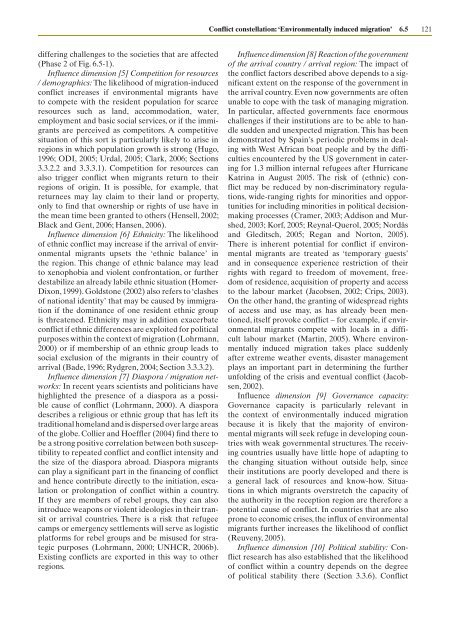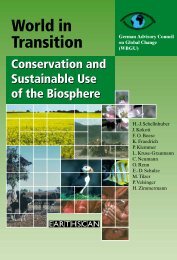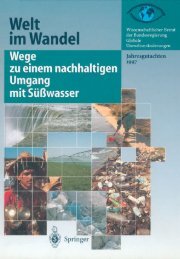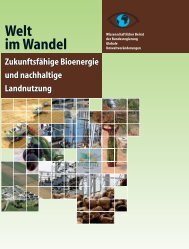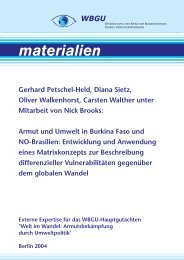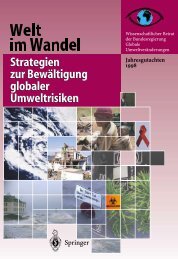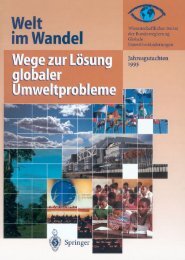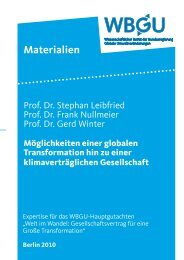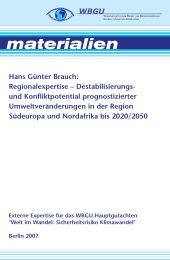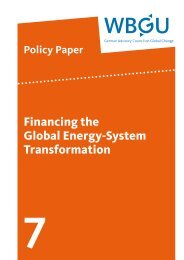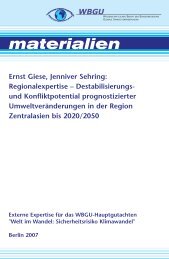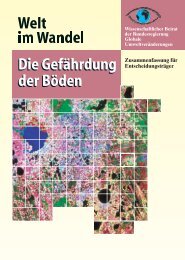World in Transition: Climate Change as a Security Risk - WBGU
World in Transition: Climate Change as a Security Risk - WBGU
World in Transition: Climate Change as a Security Risk - WBGU
You also want an ePaper? Increase the reach of your titles
YUMPU automatically turns print PDFs into web optimized ePapers that Google loves.
differ<strong>in</strong>g challenges to the societies that are affected<br />
(Ph<strong>as</strong>e 2 of Fig. 6.5-1).<br />
Influence dimension [5] Competition for resources<br />
/ demographics: The likelihood of migration-<strong>in</strong>duced<br />
conflict <strong>in</strong>cre<strong>as</strong>es if environmental migrants have<br />
to compete with the resident population for scarce<br />
resources such <strong>as</strong> land, accommodation, water,<br />
employment and b<strong>as</strong>ic social services, or if the immigrants<br />
are perceived <strong>as</strong> competitors. A competitive<br />
situation of this sort is particularly likely to arise <strong>in</strong><br />
regions <strong>in</strong> which population growth is strong (Hugo,<br />
1996; ODI, 2005; Urdal, 2005; Clark, 2006; Sections<br />
3.3.2.2 and 3.3.3.1). Competition for resources can<br />
also trigger conflict when migrants return to their<br />
regions of orig<strong>in</strong>. It is possible, for example, that<br />
returnees may lay claim to their land or property,<br />
only to f<strong>in</strong>d that ownership or rights of use have <strong>in</strong><br />
the mean time been granted to others (Hensell, 2002;<br />
Black and Gent, 2006; Hansen, 2006).<br />
Influence dimension [6] Ethnicity: The likelihood<br />
of ethnic conflict may <strong>in</strong>cre<strong>as</strong>e if the arrival of environmental<br />
migrants upsets the ‘ethnic balance’ <strong>in</strong><br />
the region. This change of ethnic balance may lead<br />
to xenophobia and violent confrontation, or further<br />
destabilize an already labile ethnic situation (Homer-<br />
Dixon, 1999). Goldstone (2002) also refers to ‘cl<strong>as</strong>hes<br />
of national identity’ that may be caused by immigration<br />
if the dom<strong>in</strong>ance of one resident ethnic group<br />
is threatened. Ethnicity may <strong>in</strong> addition exacerbate<br />
conflict if ethnic differences are exploited for political<br />
purposes with<strong>in</strong> the context of migration (Lohrmann,<br />
2000) or if membership of an ethnic group leads to<br />
social exclusion of the migrants <strong>in</strong> their country of<br />
arrival (Bade, 1996; Rydgren, 2004; Section 3.3.3.2).<br />
Influence dimension [7] Di<strong>as</strong>pora / migration networks:<br />
In recent years scientists and politicians have<br />
highlighted the presence of a di<strong>as</strong>pora <strong>as</strong> a possible<br />
cause of conflict (Lohrmann, 2000). A di<strong>as</strong>pora<br />
describes a religious or ethnic group that h<strong>as</strong> left its<br />
traditional homeland and is dispersed over large are<strong>as</strong><br />
of the globe. Collier and Hoeffler (2004) f<strong>in</strong>d there to<br />
be a strong positive correlation between both susceptibility<br />
to repeated conflict and conflict <strong>in</strong>tensity and<br />
the size of the di<strong>as</strong>pora abroad. Di<strong>as</strong>pora migrants<br />
can play a significant part <strong>in</strong> the f<strong>in</strong>anc<strong>in</strong>g of conflict<br />
and hence contribute directly to the <strong>in</strong>itiation, escalation<br />
or prolongation of conflict with<strong>in</strong> a country.<br />
If they are members of rebel groups, they can also<br />
<strong>in</strong>troduce weapons or violent ideologies <strong>in</strong> their transit<br />
or arrival countries. There is a risk that refugee<br />
camps or emergency settlements will serve <strong>as</strong> logistic<br />
platforms for rebel groups and be misused for strategic<br />
purposes (Lohrmann, 2000; UNHCR, 2006b).<br />
Exist<strong>in</strong>g conflicts are exported <strong>in</strong> this way to other<br />
regions.<br />
Conflict constellation: ‘Environmentally <strong>in</strong>duced migration’ 6.5<br />
Influence dimension [8] Reaction of the government<br />
of the arrival country / arrival region: The impact of<br />
the conflict factors described above depends to a significant<br />
extent on the response of the government <strong>in</strong><br />
the arrival country. Even now governments are often<br />
unable to cope with the t<strong>as</strong>k of man a g<strong>in</strong>g migration.<br />
In particular, affected governments face enormous<br />
challenges if their <strong>in</strong>stitutions are to be able to handle<br />
sudden and unexpected migration. This h<strong>as</strong> been<br />
demonstrated by Spa<strong>in</strong>’s periodic problems <strong>in</strong> deal<strong>in</strong>g<br />
with West African boat people and by the difficulties<br />
encountered by the US government <strong>in</strong> cater<strong>in</strong>g<br />
for 1.3 million <strong>in</strong>ternal refugees after Hurricane<br />
Katr<strong>in</strong>a <strong>in</strong> August 2005. The risk of (ethnic) conflict<br />
may be reduced by non-discrim<strong>in</strong>atory regulations,<br />
wide-rang<strong>in</strong>g rights for m<strong>in</strong>orities and opportunities<br />
for <strong>in</strong>clud<strong>in</strong>g m<strong>in</strong>orities <strong>in</strong> political decisionmak<strong>in</strong>g<br />
processes (Cramer, 2003; Addison and Murshed,<br />
2003; Korf, 2005; Reynal-Querol, 2005; Nordås<br />
and Gleditsch, 2005; Regan and Norton, 2005).<br />
There is <strong>in</strong>herent potential for conflict if environmental<br />
migrants are treated <strong>as</strong> ‘temporary guests’<br />
and <strong>in</strong> consequence experience restriction of their<br />
rights with regard to freedom of movement, freedom<br />
of residence, acquisition of property and access<br />
to the labour market (Jacobsen, 2002; Crips, 2003).<br />
On the other hand, the grant<strong>in</strong>g of widespread rights<br />
of access and use may, <strong>as</strong> h<strong>as</strong> already been mentioned,<br />
itself provoke conflict – for example, if environmental<br />
migrants compete with locals <strong>in</strong> a difficult<br />
labour market (Mart<strong>in</strong>, 2005). Where environmentally<br />
<strong>in</strong>duced migration takes place suddenly<br />
after extreme weather events, dis<strong>as</strong>ter management<br />
plays an important part <strong>in</strong> determ<strong>in</strong><strong>in</strong>g the further<br />
unfold<strong>in</strong>g of the crisis and eventual conflict (Jacobsen,<br />
2002).<br />
Influence dimension [9] Governance cap acity:<br />
Governance capacity is particularly relevant <strong>in</strong><br />
the context of environmentally <strong>in</strong>duced migration<br />
because it is likely that the majority of environmental<br />
migrants will seek refuge <strong>in</strong> develop<strong>in</strong>g countries<br />
with weak governmental structures. The receiv<strong>in</strong>g<br />
countries usually have little hope of adapt<strong>in</strong>g to<br />
the chang<strong>in</strong>g situation without outside help, s<strong>in</strong>ce<br />
their <strong>in</strong>stitutions are poorly developed and there is<br />
a general lack of resources and know-how. Situations<br />
<strong>in</strong> which migrants overstretch the capacity of<br />
the authority <strong>in</strong> the reception region are therefore a<br />
potential cause of conflict. In countries that are also<br />
prone to economic crises, the <strong>in</strong>flux of environmental<br />
migrants further <strong>in</strong>cre<strong>as</strong>es the likelihood of conflict<br />
(Reuveny, 2005).<br />
Influence dimension [10] Political stability: Conflict<br />
research h<strong>as</strong> also established that the likelihood<br />
of conflict with<strong>in</strong> a country depends on the degree<br />
of political stability there (Section 3.3.6). Conflict<br />
121


